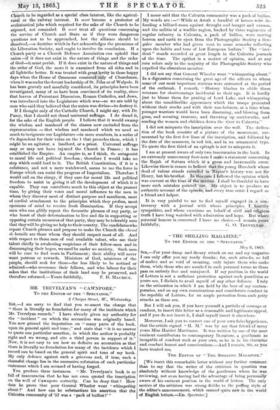• MR. TREVELYAN'S " CAWNPORE." To THE EDITOR OF THE
"SPECTATOR."
2 Clarges Street, W., Wednesday. Siit,—I am sorry to find that you re-assert the charge that "there is literally no foundation for many of the incidents which Mr. Trevelyan records." I have already given my authority for the " incident " on which the accusation was originally based. You now ground the imputation on "many parts of the book, upon its general spirit and tone ;" and state that "it is no answer to quote one particular assertion, in which the author is probably right and we wrong, and cite a third person in support of it." Now, it is not easy to see how so definite an accusation as that there is literally no foundation for many of the incidents which I record can be based on the general spirit and tone of my book. My only defence against such a grievous and, if true, such a shameful charge lies in the successive refutation of each particular statement which I am accused of having forged.
You produce three instances. Mr. Trevelyan's book is so full of inaccuracies that he has not even quoted -the inscription on the well of Cawnpore correctly. Can he deny that ? How does he prove that poor General Wheeler went whimpering about?' And how can he substantiate his assertioti that the Caltutta community of '57 was a 'pack of bulliii?' "
I never said that the Calcutta community was a pack of bullies. My words are :—" While at Arrah a handful of heroes were de- fending a billiard-room against drought and hunger and cannon, and the militia-of a warlike region, backed by three regiments of regular infantry in Calcutta, a pack of bullies, were moving heaven and earth to eject from the Photographic Society a Ben- galee member who had given vent to some remarks reflecting upon the habits and tone of low European loafers." The " inci- dent " stands recorded at great length in the Calcutta journals of the time. The epithet is a matter of opinion, and at any rate refers only to the majority of the Photographic Society who expelled the obnoxious member.
I did not say that General Wheeler went "whimpering about." In a digression concerning the great age of the officers to whom some of our most important stations were entrusted at the period of the outbreak, I remark, "History blushes to chide these veterans for shortcomings incidental to their age. It is hardly just to blame them for prating of Lord Lake, and whimpering about the unsoldierlike appearance which the troops presented without their stocks and with their sun-helmets, at a time when younger warriors would have been disarming, and blowing from guns, and securing treasure, and throwing up earthworks, and sending the women and children down the river to Calcutta."
I did not misquote the inscription over the well. The dedica- tion of the book consists of a picture of the monument, sur- mounted by the first few lines of the inscription, and followed by the date of the massacre, in red ink, and in an ornamental type. To quote the first third of an epitaph is not to misquote it.
I am at present aware of only twe inaccuracies in the book. In an extremely unnecessary foot-note I make a statement concerning the Rajah of Sattara which is a gross and inexcusable error: Likewise there is reason to believe that the young Havelock whose deed of valour stands re6orded in Napier's history was not Sir Henry, but his brother. in this case I followed the opinion which was current at the time of the mutiny. 'I shall be thankful to have more such mistakes pointed out. My object is to produce an authentic account of the epiSodetand every true critic I regard as a friend and helper.
It is very painful to we to find myself engaged in a con- troversy with a journal with whose principles I heartily sympathize, and whose exertions on behalf of civil and religious truth I have long watched with admiration and hope. But where personal honour is concerned I have no choice.—I remain yours






























 Previous page
Previous page